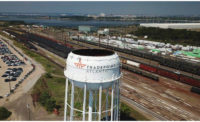Cleaning up and rebuilding in Japan may be delayed due to a lack of manufacturing capacity of heavy machinery and related components needed to do the job. Exporting construction-related goods from Japan to other parts of the globe could also prove challenging, say suppliers.

In particular, heavy-equipment producers, such as Caterpillar Inc., Komatsu Ltd. and Hitachi Ltd. report that the March 11 earthquake and resulting tsunami have hit facilities used to source components and assemble whole goods. Companies have made donations to support relief efforts.
Even companies not based in Japan are at risk of supply constraints from components sourced in Japan, says Frank Manfredi, a machinery analyst in Mundelein, Ill.
For example, Manufacturing space that Hitachi uses to build hydraulic systems and excavator parts went offline, and some of those parts typically ship to a Deere-Hitachi plant in North Carolina.
"All of these companies have tightened up their supply lines and are all doing just-in-time inventory management," says Manfredi. "They are all vulnerable."
Peoria, Ill.-based Caterpillar says that its own facilities—in Tokyo, Akashi and Sagami, well outside of the strike zone—are not damaged and are still in operation. However, production has "varied day to day over the last week" due to tight supplies at vendors' factories, it says.
Cat is working to identify which parts of the supply chain are pinched the most and "actively developing alternate sources for components produced by Japanese-based suppliers."
Komatsu suspended production at six plants, one of which is back up and running. Others sustained damage, mainly in Ibaraki and Oyama. Plants outside the disaster region report "unstable" parts supplies.
One plant, in Koriyama, Fukushima, is ready to start production, but workers face a shortage of gasoline to drive to work. Electrical power also is limited due to the nearby failed nuclear plant, says the company.
Komatsu's plants in Ibaraki—a source of large wheel loaders, dump trucks and wheel dozers—and in Koriyama—a hydraulic equipment factory—remain offline.
"We are making progress in repairs and inspection at our plants in the affected areas, and we are beginning to gradually resume production at these plants," the Tokyo-based company adds.
Even after plants gradually go back into operation, Komatsu says it may have difficulty moving goods through the Port of Hitachinaka, which was seriously damaged.
"We are concerned about the effects even after resuming our production."


